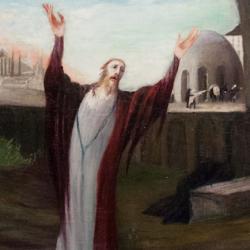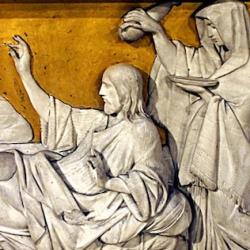Jesus condemns the scribes and Pharisees for building memorials for prophets and adorning the tombs of the righteous (Matthew 23:29). This is mere external honor, since they don’t actually follow the teachings of the prophets. It’s as insufficient as cleansing the outside of the cup.
True; but Jesus says something more surprising and puzzling. He says that their actions of memorializing prophets and their words about their fathers is a witness against them that they are sons of the ones who killed the prophets (vv. 30-31). Davies and Allison neatly capture the puzzle: “memorializing the prophets does not constitute consent to their murders. On the contrary, honouring the slain dishonors their slayers.” They ask whether this is “an instance where abbreviation of the tradition ruined the sense.”
Can we do better? We’ll see.
First, the words that Jesus quotes in verse 30 indicate that the Pharisees and scribes consider the murders of the prophets as “fathers.” As I said in an earlier post, Jesus apparently wants them to renounce this patrimony. These are not our fathers, they should say; we are “sons of the prophets.”
Second, and related to this, the wording of their denial may be significant: “If we were in the days of our fathers, we would not be partners in the blood of the prophets.” Partner is koinonoi – they deny that they have “communion” in the blood of the prophets. “Blood” is usually taken to be synecdoche for “shedding of blood,” but is something else going on. What might it mean to “partake in the blood” of the prophets?
That might suggest a kinship idea. Or, it might be a martyrdom idea. We “partake in sufferings” of Jesus (2 Corinthians 1:1), and to partake in the blood of the prophets might mean to share with them in their sufferings, to join them in being persecuted by the fathers of the scribes and Pharisees.
Perhaps the Pharisees and scribes doubly condemn themselves: On the one hand, they acknowledge kinship with the murderers, while on the other they deny that they “share blood” with the prophets. That seems overly subtle, and perhaps it is. In defense, I would say, first, that Jesus may be turning the hyperscrupulosity of the Pharisees back on them, using their own gnat-straining exegesis to trap them; and, second, Jesus has already shown Himself capable of raising objections to the Pharisees by pointing to verbal details (cf. 22:41-46).
Anyway, if this is right, Jesus is posing a choice of blood: You will be sharers in the blood of the prophets, one way or another. Either you will share their blood by adhering to them as sons, and joining them in death; or, you will be guilty of their blood by joining with their persecutors. Implication in prophetic blood is, in any case, unavoidable.















